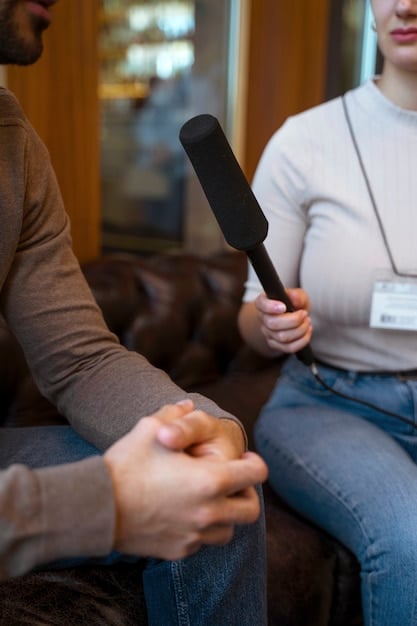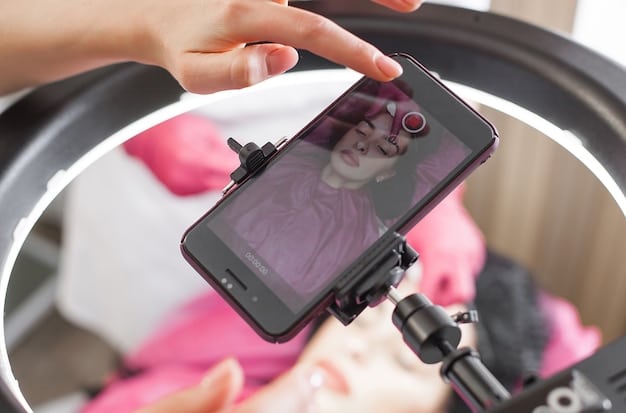Podcast Interview Techniques: Engage Guests & Get Stories

Podcast interview techniques involve employing specific questioning strategies and conversational approaches to encourage guests to share compelling stories and provide engaging content for listeners.
Want to transform your podcast interviews from mundane to mesmerizing? Mastering podcast interview techniques is essential for eliciting compelling stories and engaging your audience. Let’s dive into how to ask the right questions and create a captivating listening experience.
podcast Interview Techniques: How to Master the Art of Captivating Conversations
Understanding the Core of Effective Podcast Interviews
Effective podcast interviews go beyond simple question-and-answer sessions. It’s about creating a comfortable environment where guests feel valued and are willing to share their unique perspectives and experiences. Understanding some cores can make any kind of interview effective.
Building Rapport with Your Guest
Establishing a strong rapport early in the interview is crucial. This involves researching your guest, finding common ground, and demonstrating genuine interest in their story. This helps build trust and encourages openness. Here’s how it works:
The Importance of Active Listening
Active listening is more than just hearing what your guest says; it’s about understanding their message, both verbal and nonverbal, and responding thoughtfully. This shows your guest that you are engaged and encourages them to elaborate further.
- Pay attention to both verbal and nonverbal cues.
- Summarize and reflect on what your guest has said.
- Ask clarifying questions to ensure understanding.
- Show empathy and acknowledge their feelings.
By focusing on building a connection and actively listening, you set the stage for a dynamic and engaging interview.

Crafting Engaging Questions for Compelling Content
Engaging questions are the backbone of any successful podcast interview. These questions delve beneath the surface, spark insightful responses, and keep your audience hooked from start to finish. They are what help to make any kind of interview engaging.
The Power of Open-Ended Questions
Open-ended questions require more than a simple “yes” or “no” answer. They encourage your guest to share detailed stories, personal anecdotes, and unique perspectives, making the interview much more compelling.
Steering Clear of Leading Questions
Leading questions subtly guide your guest toward a specific answer, which can hinder their ability to express their authentic thoughts and feelings. Focus on neutral, unbiased questions that allow them to share their truth.
- Avoid assumptions in your questions.
- Use neutral language without emotional undertones.
- Let your guest guide the direction of their answers.
- Encourage diverse perspectives and viewpoints.
By asking open-ended questions and avoiding leading ones, you empower your guest to create captivating content.
Unearthing Compelling Stories: Probing Techniques
Eliciting compelling stories is an art that requires both skillful questioning and attentive listening. Probing techniques can help you uncover the hidden gems within your guest’s experiences. The following can aid you.
The Art of the Follow-Up Question
Follow-up questions demonstrate your engagement and encourage your guest to delve deeper into their story. They also help you uncover additional details and nuances that might otherwise be missed.
Navigating Sensitive Topics Respectfully
If your interview touches on sensitive or controversial topics, it’s essential to approach them with respect and empathy. This creates a safe space for your guest to share their experiences without feeling judged or exploited.
- Ask permission before delving into sensitive areas.
- Acknowledge the potential emotional impact of the topic.
- Allow your guest to set boundaries and limits.
- Offer support and resources if needed.
Using thoughtful follow-up questions and approaching sensitive topics with care can lead to incredibly powerful and impactful stories.
Structuring Your Interview for Maximum Impact
A well-structured interview keeps your audience engaged and ensures that you cover all the essential topics. A clear structure provides a roadmap for both you and your guest and helps the conversation flow naturally.
The Importance of a Clear Introduction
The introduction sets the stage for the entire interview. It should grab your audience’s attention, introduce your guest, and provide a brief overview of what to expect. This helps create anticipation and encourages listeners to stay tuned.
Creating a Natural Flow
A natural flow makes the interview feel less like an interrogation and more like a conversation. This involves transitioning smoothly between topics, building on previous points, and letting the discussion evolve organically.
- Use bridging statements to connect different topics.
- Avoid abrupt changes in subject matter.
- Encourage spontaneous tangents and digressions.
- Allow the conversation to breathe and evolve.

By crafting a compelling introduction and fostering a natural flow, you can create an interview that feels engaging and authentic.
Handling Unexpected Moments and Challenges
Even with careful planning, unexpected moments and challenges can arise during a podcast interview. Being prepared to handle these situations gracefully can save the interview and demonstrate professionalism.
Dealing with Technical Difficulties
Technical difficulties are a common occurrence in podcasting. Having backup plans and remaining calm can help you navigate these issues without disrupting the flow of the interview.
Recovering from a Stalled Conversation
Sometimes, a conversation might stall or lose momentum. Knowing how to reignite the discussion with engaging questions or a change of pace can keep the interview interesting.
- Use open-ended questions to prompt further discussion.
- Share a personal anecdote or related story.
- Introduce a new topic or angle to explore.
- Take a brief break or change of scenery if possible.
By anticipating potential challenges and developing strategies to overcome them, you can maintain control and ensure a smooth and engaging interview.
Post-Interview Best Practices
The work doesn’t end when the interview is over. Post-interview best practices, such as editing and promotion, are essential for maximizing the impact of your conversation.
The Art of Thoughtful Editing
Thoughtful editing involves removing unnecessary pauses, filler words, and technical glitches while preserving the authenticity and integrity of the interview. This helps create a polished and professional listening experience.
Promoting Your Interview Effectively
Promoting your interview through various channels, such as social media, email marketing, and guest appearances, can help you reach a wider audience and increase listenership.
- Create eye-catching graphics and audiograms.
- Share snippets and quotes on social media.
- Collaborate with your guest on promotion.
- Engage with your audience and solicit feedback.
By editing thoughtfully and promoting strategically, you can ensure that your podcast interview reaches its full potential and resonates with listeners.
| Key Point | Brief Description |
|---|---|
| 🤝 Building Rapport | Establish trust early by researching your guest and showing genuine interest. |
| 🗣️ Open-Ended Questions | Use questions that encourage detailed stories and personal anecdotes. |
| 🎙️ Thoughtful Editing | Remove unnecessary pauses while preserving the interview’s authenticity. |
| 📢 Promotion | Promote your interview to reach a wider audience through various channels. |
Frequently Asked Questions
▼
Thorough preparation involves researching your guest, understanding their background and expertise, and crafting a list of engaging, open-ended questions that align with your podcast’s theme.
▼
Establishing a comfortable atmosphere early in the interview helps guests open up. Simple ways to do this include smiling, making eye contact, and engaging in friendly small talk before diving into the main questions.
▼
Rephrasing the question, breaking it down into smaller parts, or offering a related anecdote can help a guest overcome a mental block. Showing patience and being encouraging is also key.
▼
Excellent sound quality is crucial for a professional-sounding podcast. Using high-quality microphones, recording in a quiet environment, and editing audio to remove background noise are vital steps.
▼
Sharing the interview on social media, creating audiograms for visual platforms, collaborating with guests to cross-promote, and engaging with listener feedback are effective strategies for promotion.
Conclusion
Mastering podcast interview techniques is vital for creating engaging content that resonates with your audience. By focusing on building rapport, crafting thoughtful questions, and promoting your interviews effectively, you can elevate your podcast and leave a lasting impression on your listeners.





